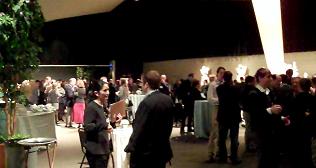How Was the Billionaire’s Singularity Dinner? We’ll Show You

Share
Five minutes is not enough time to save the world, but it might be enough time to get people to help finance you saving the world. Last night, Peter Thiel and The Thiel Foundation's Audacious Optimism dinner gathered some 200 guests in the San Francisco Palace of Fine Arts to hear presentations from eight organizations bent on changing our collective future. Most were focused on the advancing technologies we would associate with the Singularity. All were in need of money. Luckily they came to the right place. As we outlined yesterday, some very wealthy and influential people from Silicon Valley were in attendance. So was I. Now you can be, too. Check out videos of the eight presentations below, along with the closing statement from Peter Thiel. Would you have donated to any of these groups to help them achieve their vision of the future?
The Santa Fe Institute takes a multidisciplinary approach to science. They gather some of the most brilliant names in various fields, promote their work, and try to get them to collaborate in new and interesting ways. Chris Wood is their Vice-President for Administration.
Those who regularly read the Hub will know Singularity University. It's Ray Kurzweil and Peter Diamnadis' relatively new educational organization aimed at informing the next generation of leaders about the changes accelerating technologies could create. Students are encouraged to form new entrepreneurial endeavors that could leverage these technologies to help billions of people in the years ahead. Think business school meets the Singularity. Neil Jacobstein is President of SU.
Humanity+ wants the future to be positive. To that end they gather like minded thinkers to contemplate advancing technologies, the problems they could create, and the solutions to those problems. They also openly support human augmentation (transhumanism). Ben Goertzel is a well known researcher in the field of artificial intelligence (and has contributed a post to the Hub in the past).
The Singularity Institute wants to bring science to new places and promote an empirical review of futurism. They regularly gather some of the leading names in advanced technology at their annual Singularity Summit. Michael Vassar is President of SI and has impressed me in the past with his view on the history of science.
Nanotechnology and molecular machines are the central interest of the Foresight Institute. Their Feynman Prize is an annual $5000 award for excellence in molecular nanotech, while their Feynman Grand Prize is a $250,000 bounty that will be given to the first team that can build specific nano devices (including a nanoscale robot arm). Christine Peterson is the President of Foresight.
The SENS Foundation is working to fight aging. It has its own research center and promotes collaborations and longevity related research projects through its extensive network of affiliates. If you're familiar with the work of Aubrey de Grey you understand much of what SENS is hoping to accomplish. Mike Kope is the co-founder of SENS, and its CEO.
Be Part of the Future
Sign up to receive top stories about groundbreaking technologies and visionary thinkers from SingularityHub.


Of all the organizations that presented at the event, The Seasteading Institute was perhaps the least connected to the Singularity, yet their ideas about the future were no less world-changing. In the hopes of experimenting with new forms of government, Seasteading is raising capital to build ocean based "startup countries" in the forms of ships, or stationary platforms at sea. These floating nations would be the grounds for discovering new means of governing ourselves and hopefully bring improvements to global politics. Patri Friedman is Seasteading's founder and executive director.
The X Prize Foundation has already achieved worldwide fame by promoting private businesses to enter into the space race. While the original X Prize for traveling to and from near orbit has already been claimed, more are being created in various sciences. The general formula remains the same: offer a substantial reward for the first team that achieves a specific task and through that reward accelerate the competition, innovation, and ambition in a field of technology. Peter Diamandis is a chairman of the X Prize Foundation.
After the lightning talks, Peter Thiel gave a brief speech outlining his beliefs about progress and growth. He called for investors to throw their weight behind new ideas, even if some of them sound 'weird', for the sake of building a better future. Just to show that his money is where his mouth is, The Thiel Foundation announced that they would match the first $1000 donation made by each of the evening attendees to any of the groups presenting.
Talking to various people at the event, it surprised me how many attendees were already affiliated with at least one of the presenting groups. Even when someone hadn't previously donated to any of the organizations, they already knew something about their policies and interests. In other words, I'm not sure how much the lightning talks were really giving new information to their audience. Of course, educating people in the finer points of each institution likely wasn't the point. It was probably more about cross pollinating between the organizations. Apparently, that's how a lot of these fund raisers go. It will be interesting to see how successful the evening proves to be, and to find out whether or not The Thiel Foundation's matching offer entices people to donate.
When I wrote my preview of the Audacious Optimism event I was skeptical of the value placed in investing with these organizations. Why give money to a group that promotes the ideas of the Singularity when you could simply give your hard earned cash directly to the companies and scientists who were working on the technologies that would enable that future to happen? While I haven't completely surrendered that point of view, the presentations from last night made me realize two things. First, some of these organizations actually are the scientists and businesses which are making advances in technology. Secondly, and more applicably, these organizations are part of a larger trend of investing in the far (or radical) future. Whether or not a single group succeeds, the financial power granted to these institutions could have a snowballing effect to attract more mainstream interest to the field of futurism as a whole. That's valuable. If I were a Silicon Valley millionaire would I donate to these groups? Maybe so. It depends on how much money I had already wasted on my robot legs, virtual asteroid, and TRON motorcycle.
*Update 12.13.10: The Thiel Foundation has uploaded high quality videos of the presentations. You can find them via the event's Facebook Page, or their YouTube channel.
[image and video credits: Aaron Saenz/Singularity Hub]
Related Articles

Data Centers in Space: Will 2027 Really Be the Year AI Goes to Orbit?

How Scientists Are Growing Computers From Human Brain Cells—and Why They Want to Keep Doing It

Scientists Say We Need a Circular Space Economy to Avoid Trashing Orbit
What we’re reading
